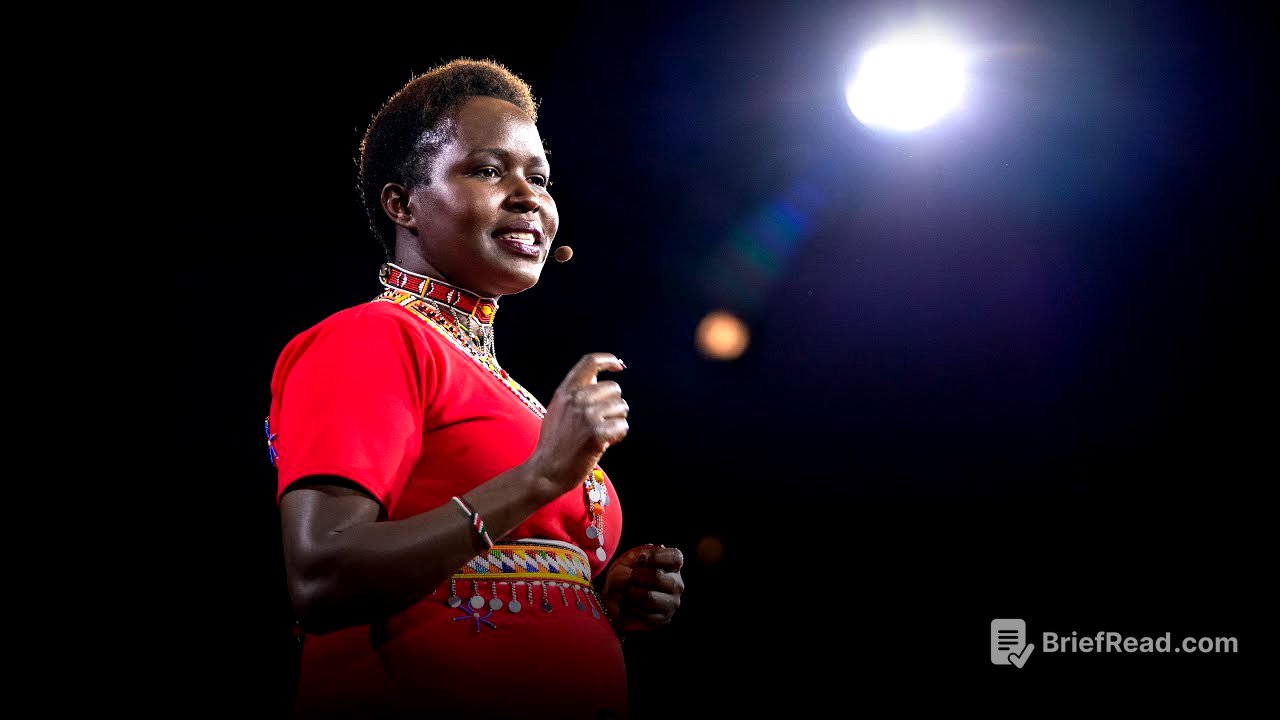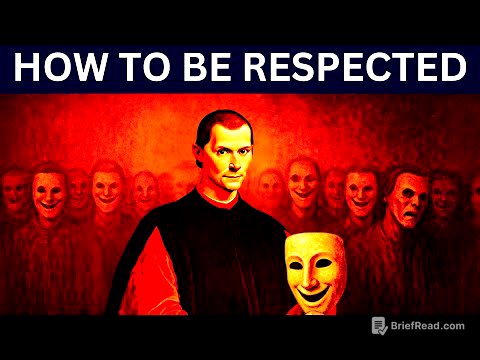TLDR;
Kakenya Ntaiya shares her journey from rural Kenya, where she underwent FGM and was expected to marry young, to building a school for girls and transforming her community. She highlights the importance of education, safety, and community support in empowering girls to reach their full potential and break free from harmful traditions like FGM and child marriage. Ntaiya emphasises that empowering girls transforms communities by creating future doctors, teachers, and leaders.
- Education is key to empowering girls and transforming communities.
- Creating safe environments and addressing basic needs are essential for girls' education.
- Community involvement, including elders, fathers, mothers, and boys, is crucial for sustainable change.
Introduction [0:00]
Kakenya Ntaiya begins by stating her dream of empowering girls through education, which led her to build a school. She realised that empowering a girl transforms the entire community, making school just the beginning of a much larger change.
Early Life and Challenges [0:17]
Ntaiya recounts her childhood in rural Kenya, where she helped her mother with household chores and farm work. Like other Maasai girls, she was engaged to be married at a young age and underwent female genital mutilation (FGM), which was meant to mark the end of her childhood and education. Despite this, she negotiated with her father to continue her education.
Returning to Her Village [1:18]
After university, Ntaiya returned to her village and found that little had changed. Girls were still undergoing FGM, leaving school, marrying young, and becoming teenage mothers. This motivated her to build a school specifically for girls to protect them from FGM and early marriage.
Building the School [1:47]
Ntaiya built a school for girls, hoping to enrol 10 students, but 100 girls came. She realised the magnitude of her dream but soon understood that the school alone wouldn't be enough. The first year, she enrolled 30 girls, some of whom had been abused or orphaned, while others came from traditional families that had never sent girls to school.
Addressing Basic Needs [2:33]
Despite their excitement, the girls struggled to stay awake in class. Ntaiya realised they were hungry and quickly found a cook and food. She then understood the need for a boarding school because the girls were tired and hungry from chores and long walks, and they were also unsafe, facing assault, rape, and kidnapping on their way to school. She understood that girls needed to feel safe, rested, and well-nourished before they could learn.
Faith's Story [3:32]
Ntaiya shares the story of Faith, who came from a traditional family where her older sister had already undergone FGM and married. Determined to attend Ntaiya's school, Faith stole an egg, sold it for a pencil, and walked five miles to enrol. The school provided Faith with food, medicine, counselling, and a supportive community. After six months, Faith was a happy sixth-grader who dreamed of becoming a pilot, with her family now supporting her and her younger sisters set to follow in her footsteps.
The Economic Impact of Child Marriage [5:11]
Child marriage is projected to cost the global economy trillions of dollars over the next 15 years. Ntaiya emphasises that child marriage deprives her village of potential doctors, teachers, entrepreneurs, and true partners for men, hindering the community's ability to escape poverty.
Community Involvement [5:39]
Ntaiya realised she couldn't achieve her dream alone and sought support from community elders, forming a board with religious leaders, parents, and teachers. She needed allies in the government and community, especially the chief, to enforce the no-FGM policy. Despite initial resistance, the chief became a strong ally.
Momposhi's Transformation [6:38]
Ntaiya tells the story of Linet, whose father, Momposhi, didn't believe in girls' education. Ntaiya persuaded Momposhi to visit the school by using the pretense of revealing Linet's grades. With each visit, Momposhi built a strong relationship with his daughter and recognised her potential. When Linet was accepted into a top national high school, Momposhi proudly shared the news and personally took her to the new school in Nairobi. Linet is now studying at university in Australia, and Momposhi is a strong advocate for girls' education in the community.
Engaging Mothers and Grandmothers [8:06]
Ntaiya involved mothers, including her own, in the education of their children. She also brought grandmothers into the mix, recognising them as keepers of Maasai stories and culture. Grandmothers now do story time with the girls, connecting them to their heritage.
Working with Boys [8:39]
Ntaiya began working with boys to change their mindsets. She partnered with "I'm Worth Defending" to create a training program for boys and girls who couldn't attend her school, sharing information about gender equality, health, and human rights. The program has reached over 10,000 boys and girls.
Community Transformation [9:28]
Nearly 400 girls in Ntaiya's village have not undergone FGM, in a region where nearly 80 percent of women have been cut. These girls are sharing their experiences, making this the new normal in the community.
Meeting President Obama [10:09]
President Obama met Linet during his visit to Kenya in 2015. They discussed a Kenya where all girls have equal opportunities and where communities like Enoosaen thrive because all members have opportunities.
Conclusion [10:53]
Ntaiya emphasises the importance of helping communities see the value in every daughter and helping every girl recognise her own potential. She concludes by promising to continue dreaming and working until girls like Linet and Faith achieve their dreams and all communities enable every woman and girl to fulfil their aspirations.









